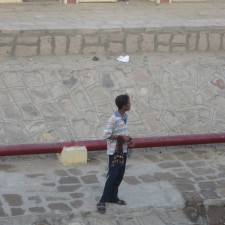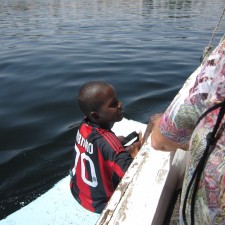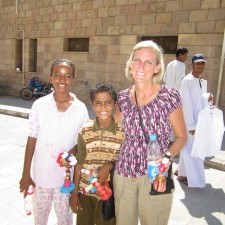 Egyptian culture is very different from US culture in so many ways but none more obvious than how they treat their children. On our way over from the US to Jordan there was a woman traveling with a two-year-old and a little tiny baby no more than 3 or 4 months old. The two-year-old was none too happy about the plane flight and he made his unhappiness known to all in the cabin. Strangely, none of the middle-eastern people seemed to be upset by the child’s cries. In the US, the poor woman would be the recipient of stares, clucks and sometimes open glares of contempt that her child dare violate the airspace with its cries of unhappiness. Not these travelers. They did all the requisite things to calm the child, but at no point did they look the least bit distressed. At one point the male flight attendant went over and took the child from his mother. He spent some time holding the child, swaying back and forth cooing soothingly to the toddler. In the Cairo airport, young children were seen running around the terminal completely unattended. Riding through the cities and the countryside, you could see young children wandering around the busy streets seemingly by themselves.
Egyptian culture is very different from US culture in so many ways but none more obvious than how they treat their children. On our way over from the US to Jordan there was a woman traveling with a two-year-old and a little tiny baby no more than 3 or 4 months old. The two-year-old was none too happy about the plane flight and he made his unhappiness known to all in the cabin. Strangely, none of the middle-eastern people seemed to be upset by the child’s cries. In the US, the poor woman would be the recipient of stares, clucks and sometimes open glares of contempt that her child dare violate the airspace with its cries of unhappiness. Not these travelers. They did all the requisite things to calm the child, but at no point did they look the least bit distressed. At one point the male flight attendant went over and took the child from his mother. He spent some time holding the child, swaying back and forth cooing soothingly to the toddler. In the Cairo airport, young children were seen running around the terminal completely unattended. Riding through the cities and the countryside, you could see young children wandering around the busy streets seemingly by themselves.
Early on in our trip, it became apparent that Egyptian mothers have a whole different take on child safety than we do. Taking a Felucca ride on the Nile River in Aswan we saw a little boy about six years old sitting in the water on what could have been part of a foam pool raft. At first I thought that maybe he was playing on the shore with his parents and siblings and somehow had drifted away from them. Then he looked up and spied our boat. He pulled out two little cardboard pieces and started paddling toward our boat. David and I watched, fascinated, as the little boy paddled up alongside our boat and grabbed the railing right by where I was sitting. My first instinct was to grab the little tyke out of the water, wrap him in a towel and explain to him how dangerous it was to go floating down the Nile without his Momma. He grabbed the side of our boat hitching a ride like it was the most normal thing in the world. As he floated along with us, he looked up at me and asked, “English?” When I responded yes, he broke into a shouting rendition of “Row, row, row your boat.” After he had gone through several songs in different languages, we tipped him 5 pounds and he let go of the boat and paddled off toward the next felucca filled with tourists. Mustafa, our guide, explained that young Nubian boys worked on the river. They all learned a song from various countries. When they approached a boat of tourists, they ascertained where they were from and then serenaded them in hopes of getting a small tip. These little boys sang to earn a few pounds a day to help support their family.
During our cruise to Luxor our boat was accosted by boys in motor boats. They basically ran their boat into the side of the cruise ship, flung a rope up and over the rail, caught the loose end and surfed alongside. They brought out blankets, scarves, table clothes and shirts. The stood on the top of their moving boats screaming, “hello” to get the attention of anyone on board the ship so that they could sell their wares. If you wanted to purchase something, they put it in a plastic bag and heaved it to you. If you decided to keep it, they sent you something else that you would put your money in and threw it back down to them. If the item missed the target, over the side the youngest boys would go to retrieve the package and swim back to the nearest boat. When we entered the locks just before Luxor, little boys no more than 8 years old entertained the tourists on board by diving into the water in front of the boat.
Every stop we made, we were engaged by little boys anywhere from 6 to 10 years old selling their wares. At the Valley of the Kings, we were approached by our first young girl. She was probably 10 years old and her name was Zena. We bought one of the cloth camels she was selling. She let me take my picture with her. We saw her several more times during our visit. At the end, everyone was using the washroom and she shyly walked up to me and handed me a little cloth doll. She said, “You are nice, pretty lady. No money, this is gift for you.” With that she gave me a shy smile and walked away.
In the US, we barely expect our children to clean up their own rooms much less go out into the deep waters of the Nile to get tips to help support us. Clearly there are no child protective services in Egypt. Throughout our trip we were met by small children selling bracelets, necklaces and other wares. Every time I saw one of these babies out on the streets all by themselves, talking to strangers, my first thought was “Where’s your Momma?!”
